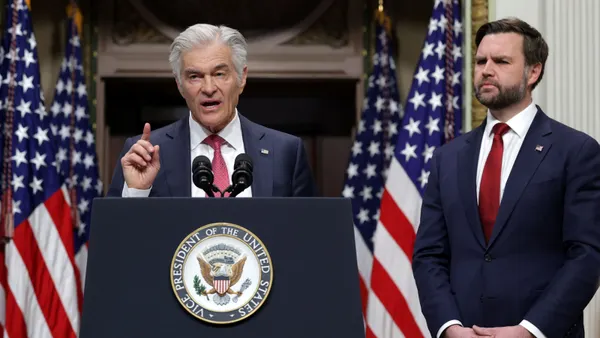Dive Brief:
- An activist investor group is asking UnitedHealth to change its bylaws to prevent its chief executive officer and board chair from being the same person, arguing it will improve oversight during a difficult time for the healthcare behemoth.
- The Accountability Board filed a formal proposal on Friday in response to Stephen Hemsley, the chair of UnitedHealth’s board, also being named CEO of the company in May after former CEO Andrew Witty’s surprise resignation.
- The move undercut the board’s traditional checks and balances by consolidating executive power, according to the Accountability Board. UnitedHealth declined to comment on the proposal.
Dive Insight:
UnitedHealth is facing a sea of recent difficulties, including a massive cyberattack requiring billions of dollars in response costs, rising medical expenses shrinking the profitability of its insurance division and antitrust probes from federal regulators. The massive healthcare company is also embroiled in a public relations crisis following the killing of its top insurance executive late last year.
UnitedHealth’s stock has plummeted as the string of crises make investors less bullish on the company, despite its broad market power and record $400.3 billion in revenue last year.
UnitedHealth's stock has fallen 29% this year
Witty stepped down as CEO in May, citing personal reasons. In his place, the board appointed Hemsley, the 73-year-old chairman of UnitedHealth’s board and its CEO from 2006 to 2017.
Analysts said the move would likely restore some confidence in UnitedHealth, given Hemsley built the company into the diversified healthcare behemoth it is today during his first tenure as CEO. However, not everyone is so sure that handing the reins over to Hemsley was a good idea.
The Accountability Board,which invests in upwards of 100 of the largest publicly traded companies in the U.S., is now calling for a policy to keep the CEO and board chair roles separate. The reform would restore trust in UnitedHealth’s board by ensuring it can provide objective oversight of management, the activist group said.
The Accountability Board engaged with UnitedHealth before filing the proposal, and found its rationale for combining the CEO and board chair roles “deeply flawed,” Matt Prescott, the president and chief operating officer of the group, told Healthcare Dive over email.
The proposal points to UnitedHealth’s Corporate Governance Principles, which were issued six months before Hemsley was named CEO. The principles say the roles should be autonomous “as an aid in the Board’s oversight of management and to allow the Chief Executive Officer to focus primarily on management responsibilities,” according to the proposal.
“In our view, independent Chairs are like seatbelts: it’s easy to forget you might need one when the road is smooth but once the storm rolls in, you’re sure glad it’s there,” Prescott said. “UnitedHealth has been in the middle of a storm and needs the added guardrail of an independent Chair — someone who can challenge management’s assumptions and ensure senior executives are acting in the best interests of shareholders.”
The Accountability Board’s proposal isn’t the first push for reform from investors concerned about UnitedHealth’s trajectory.
In January, a faith-based group of investors asked UnitedHealth to analyze the impact of healthcare delays and denials on the company and U.S. patients. Though, following multiple challenges from UnitedHealth, the group withdrew the proposal in April before it had a chance to come to a shareholder vote.
A group of investors also sued UnitedHealth in May, arguing that the company didn’t properly disclose to shareholders how the killing of UnitedHealthcare CEO Brian Thompson impacted the company.
Amid the turmoil, in August UnitedHealth formed a new public responsibility board committee in a bid to improve corporate governance. Hemsley has also pledged to increase public transparency moving forward.














